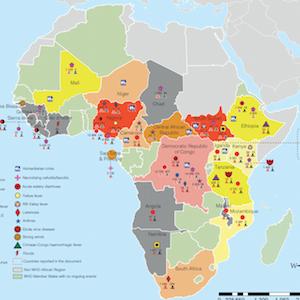Infectious diseases never go away.
Living in the developed world, it's certainly tempting to think that they do. Our triumph over microbes has lulled many people into a false sense of security, which has, in part, fueled the anti-vaccine movement. If we don't see people dying of diphtheria, is a vaccine against it actually necessary?
Citizens of the developing world don't have the luxury to ask such questions. That's because, on a daily basis, they are reminded of the devastating impact of infectious disease. A recent report by the World Health Organization, called the Weekly Bulletin on Outbreaks and Other Emergencies, provides a glimpse into the infectious disease burden in Africa. It paints a stark picture.
Consider the Democratic Republic of Congo. Due to violent conflict, that nation is dealing with an enormous humanitarian crisis that has displaced millions of people. Partially as a result, the country is experiencing a cholera epidemic, which has infected nearly 13,000 people and killed 407, just in 2018 alone. There's also a measles epidemic, which has infected over 14,000 and killed 155, as well as a monkeypox outbreak, infecting nearly 3,000 and killing 36. Congo also has Ebola, which has infected 53 people and killed more than half of them.
Nigeria is fighting many of the same diseases, in addition to the country's largest ever outbreak of Lassa fever. Like Ebola, Lassa is a hemorrhagic fever that can cause people to bleed out of their orifices. Unlike Ebola, Lassa is far less deadly with a case-fatality rate of about 1%. Currently, Lassa is only found in West Africa, but the Ebola epidemic of 2014 should dispel any notion that it will remain only in that region.
The rest of the continent similarly is being ravaged by infectious disease. There are lessons to be drawn.
First, infectious disease remains a national and global security threat. Because of the ease with which people can travel around the world, we should expect other exotic diseases to arrive in America. Ebola, Lassa, and Zika have already done so, and yet-to-be-identified microbes are also likely to be imported.
Second, war and natural disasters exacerbate infectious disease. Cholera, in particular, spreads rapidly in unsanitary conditions, as was demonstrated following the earthquake in Haiti in 2010. Approximately 800,000 were infected and more than 9,000 were killed.
Finally, the best cure for infectious disease is prevention. That means it is within the U.S.'s national interest to extinguish outbreaks abroad before they cause disruption globally. As it turns out, a humanitarian act of kindness in a foreign country allows us to reap public health and national security rewards at home.




